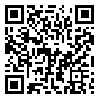Volume 6, Issue 2 (December 2020)
Elderly Health Journal 2020, 6(2): 85-90 |
Back to browse issues page
Download citation:
BibTeX | RIS | EndNote | Medlars | ProCite | Reference Manager | RefWorks
Send citation to:



BibTeX | RIS | EndNote | Medlars | ProCite | Reference Manager | RefWorks
Send citation to:
Sanati T, Vaezi A, Jambarsang S. Medication Adherence Status and its related Factors among Older Adults in Yazd, Iran. Elderly Health Journal 2020; 6 (2) :85-90
URL: http://ehj.ssu.ac.ir/article-1-152-en.html
URL: http://ehj.ssu.ac.ir/article-1-152-en.html
Department of Nursing, School of Nursing and Midwifery, Research Center for Nursing Care and Midwifery in Family Health, Shahid Sadoughi University of Medical Sciences, Yazd, Iran , vaeziali@ssu.ac.ir
Abstract: (2414 Views)
Introduction: One of the main problems facing different societies in the world, including Iran, is population aging and its consequences. With individuals entering old age, the possibility of being afflicted with one or more chronic diseases increases, which in turn results in more use of medications and medication adherence. This study has examined medication adherence status and its related factors among older adults in Yazd, Iran.
Methods: Totally 196 individuals aged 60 years old and higher in Yazd were entered randomly in this cross-sectional study. The data were collected using Morisky Medication Adherence Scale. Chi-square and Gamma tests were used for data analysis.
Results: The medication adherence was weak in 79.1%, average in 19.9%, and high in only 1% of the participants. There was not a significant relationship between demographic variables and medication adherence.
Conclusion: As most of the participants were weak in medication adherence, the necessary actions for the identification of other factors that lead to the reduction of medication adherence can pave the way for providing solutions for increasing medication adherence in this age group.
Methods: Totally 196 individuals aged 60 years old and higher in Yazd were entered randomly in this cross-sectional study. The data were collected using Morisky Medication Adherence Scale. Chi-square and Gamma tests were used for data analysis.
Results: The medication adherence was weak in 79.1%, average in 19.9%, and high in only 1% of the participants. There was not a significant relationship between demographic variables and medication adherence.
Conclusion: As most of the participants were weak in medication adherence, the necessary actions for the identification of other factors that lead to the reduction of medication adherence can pave the way for providing solutions for increasing medication adherence in this age group.
Type of Study: Research |
Subject:
Special
Received: 2019/04/11 | Accepted: 2020/11/14 | Published: 2020/12/28
Received: 2019/04/11 | Accepted: 2020/11/14 | Published: 2020/12/28
Send email to the article author
| Rights and permissions | |
 |
This work is licensed under a Creative Commons Attribution-NonCommercial 4.0 International License. |








